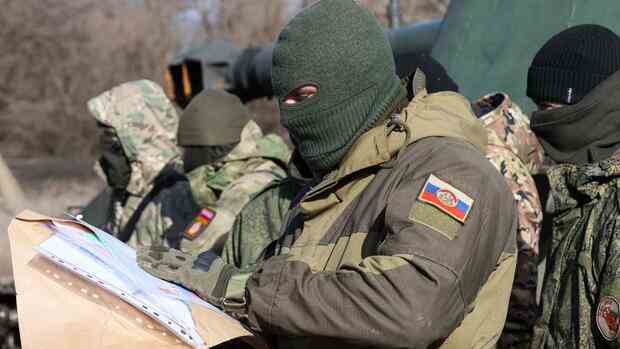Geneva Will Kremlin chief Vladimir Putin be charged as a war criminal? One year after the start of the Ukraine war, the European judicial authority Eurojust announced in The Hague a center for criminal investigations into Russian aggression. Crucial evidence is to be collected there, Eurojust announced on Thursday in The Hague.
The new center will be ready to go in the summer. The Russian leadership must also be prosecuted, said Ukrainian prosecutor and Eurojust member Myroslava Krasnoborova. “Impunity must not be accepted.” Seven states are to work together in the investigative unit, as well as the International Criminal Court.
Meanwhile, United Nations investigators in Ukraine are also working on the limit. “The extent of the war crimes is unmanageable,” says Erik Møse, chairman of the Independent International Commission of Inquiry into Ukraine, in an interview with the Handelsblatt. “We cannot document all crimes.”
On behalf of the UN Human Rights Council, he and a good two dozen employees collect court-proof evidence that can be used in possible criminal proceedings. He intends to present a comprehensive report in March 2023.
The Ukrainians are also investigating themselves: prosecutor Krasnoborova identified more than 71,000 suspected war crimes. Charges were brought against only 276 people, 99 trials were opened and 26 judgments were passed. War crimes include torture, murder, rape, displacement and attacks on civilian targets.
Many war crimes go unpunished
The sheer scale of the crime is one thing. The punishment of those responsible from Russia, however, is a completely different problem: from mercenaries of the private Wagner militia to soldiers of the army to the supreme warlord, President Vladimir Putin, thousands of people have directly or indirectly participated in war crimes.
According to the current state of investigation, Russia has also attacked numerous civilian buildings.
(Photo: AP)
So far, most criminals have gotten off scot-free – and impunity may continue. As long as Putin is in power, Russia will hardly bother with a legal investigation of the atrocities. Transferring the perpetrators to international or national courts abroad is out of the question.
Will Putin ever have to answer himself in court for his criminal orders? “It is extremely complicated, both politically and legally. I don’t want to speculate, but that doesn’t seem realistic to me at the moment,” says Volker Türk, UN High Commissioner for Human Rights.
Claus Kress, Professor of Criminal and International Law at the University of Cologne, emphasizes that Putin’s unleashing of aggression was, so to speak, the “original sin” that led to other crimes. Aggression, i.e. the use of military force by one state against another, is one of the “most serious crimes” in international law, alongside genocide, crimes against humanity and war crimes. The International Criminal Court in The Hague is responsible, and its chief prosecutor is also investigating in Ukraine.
Russia blocks The Hague
But the court is currently not allowed to investigate Putin and his helpers or even issue arrest warrants. The reason: Russia has not acceded to the Rome Statute of the International Criminal Court. Only the UN Security Council could refer the case to The Hague. But in this body Russia has a right of veto.
However, Putin cannot thwart criminal court proceedings for the other three most serious crimes under the Rome Statute.
“There is currently a gap in accountability, especially in the case of the crime of aggression, and this is serious,” said international law expert Kress at a hearing in the Bundestag. Ukraine and several other countries are currently trying to establish a special criminal court for Russia’s aggression.
The UN General Assembly could set up a special tribunal through a resolution. Whether the required majority can be found in the General Assembly is “certainly an open question at the moment,” Kress points out. Foreign Minister Annalena Baerbock (Greens) also outlined a proposal in January for setting up a special court for aggression.
Overwhelming Evidence of Russian War Crimes
Beyond possible criminal proceedings, the commission of the UN Human Rights Council under Møse continues to do its job. “The rapes committed by some soldiers of the Russian armed forces were shocking. The victims were between four and over 80 years old,” he reports.
The Norwegian lawyer is leading the UN investigation into Russian crimes in Ukraine.
(Photo: IMAGO/Ukrinform)
So far, the UN team has collected overwhelming evidence of war crimes in the Kiev, Chernihiv, Kharkiv and Sumy regions: arbitrary executions, unlawful detention, torture, ill-treatment, various forms of sexual violence, disappearances, shelling of schools, hospitals and other civilian targets.
The victims of the executions bore the usual marks of this crime: shots in the head, blunt trauma, or slit throats. There were signs of torture such as bruises, wounds and fractures, Møse reports.
Now he and his team are investigating the Russian attacks on the Ukrainian population’s energy supply. And they are attempting to respond to allegations by Ukrainian officials that Russia’s President Putin and his war machine are responsible for genocide.
As expected, Russia is opposed. “We have tried several times to contact the Russian authorities,” says Møse. “They did not accept our initiative to cooperate and share information.”
More: A year of war – How things will continue for Ukraine
